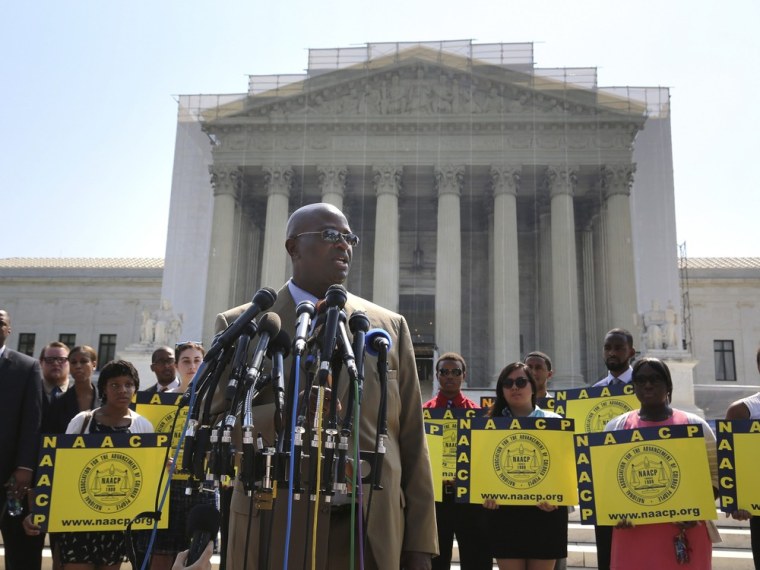Analysis -- A divided Congress faces skepticism about its ability to function as it now meets the challenge of revising a key portion of the Voting Rights Act. And recent history provides ample evidence to fuel the lack of optimism in handling this political hot potato.
The current Congress has been unable to pass bills on issues from gun control to the budget and even the farm bill. Matters once considered routine have been hung up by partisanship and ideology. The last Congress was the least productive in history when quantified by passed legislation, and this Congress is not far off that pace.
Now that the Supreme Court dropped a landmark legislative decision in Congress’s hands Tuesday, it’s difficult to see the political will to handle such a politically sensitive issue, one wrapped up in race, voting rights and charges of voter suppression and fraud.
“The Supreme Court effectively kicked this back across the street to Congress, but in practice. In reality it’s probably the death knell of this provision,” said Tom Goldstein, the publisher of SCOTUSblog and a Supreme Court analyst for NBC News.
Striking down the formula to determine which states and counties are covered by section 5 of the Voting Rights Act in a 5-4 vote, Chief Justice John Roberts said it’s now up to members of Congress who “may draft another formula based on current conditions.”
They “may” – or they may not, but early signs are not positive.
President Barack Obama urged lawmakers to act, saying “I am calling on Congress to pass legislation to ensure every American has equal access to the polls.”
But reactions from Capitol Hill suggest real problems lie ahead.
Two of the decisive players are liberal Senate Judiciary Committee Chairman Patrick Leahy, D-Vt., and conservative House Judiciary Chairman Bob Goodlatte, R-Va.
Leahy pledged quick action, pledging, “I intend to take immediate action to ensure that we will have a strong and reconstituted Voting Rights Act that protects against racial discrimination in voting.”

Missing from Goodlatte’s reaction, however, was any hint of his intention to hold hearings on ways to revise the law. Of course, not acting is a choice too. “The Supreme Court has now decided that original coverage formula does not meet constitutional requirements,” Goodlatte noted. “This decision in no way affects the permanent, nationwide ban on racial discrimination in voting found in Section 2 of the Voting Rights Act, which remains in place.”
Congress designed the coverage formula in 1965, nearly a half-century ago. And there’s no doubt about how difficult a task of designing a new one would be with a Republican House and a Democratic Senate.
Other legislative battles are in store for the rest of this year: an overhaul of immigration laws, oversight of the Internal Revenue Service, raising the government’s borrowing limit, confirmation of Obama’s nominees, U.S. intervention in Syria. There’s no shortage of other fights – and much potential for a residue of bitterness from those battles.
And the process itself is daunting.
In hearings, Congress would need to take testimony on whether election officials have instated or allowed persistent barriers to voting and registration. Some states not covered under the old formula, which Congress struck down Tuesday, would need to come under scrutiny.
Would members of Congress from Ohio, for example, admit that there are barriers to voting there and agree that Ohio should be covered? It would mean that local elections officials in Ohio would need to get pre-approval from the Justice Department for all their electoral decisions, such as where to locate election precincts and polling locations.
New York University law professor Richard Pildes, a voting rights expert and a legal adviser to the 2008 Obama campaign, said on MSNBC after Tuesday’s decision that this was moment for Obama, a former constitutional law professor, to lead the nation to a solution.
“I actually think there’s probably nobody in political office today who understands these issues better than President Obama – he understands their history, he understands the doctrine, he understands the policy consequences on the ground. He might not have wanted to be thrust into the middle of these kinds of issues, with everything else on the agenda, but he is the person best positioned to lead the country forward on how we respond to the decision.”
But even the White House acknowledges the political realities.
"This is not a welcome decision, by any means, but there is a theoretical path for Congress to update the statute in ways that would make it constitutional." A senior adviser told NBC News: "As a practical matter, that may be difficult to do given political dynamics."